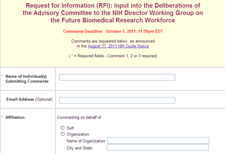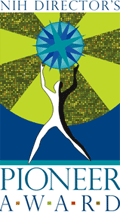The Lasker Awards recognize major contributions to understanding and treating, curing or preventing disease. The 2011 prizes were announced yesterday, and we’re proud that two former NIGMS grantees, Franz-Ulrich Hartl of the Max Planck Institute of Biochemistry and Arthur L. Horwich of the Yale School of Medicine, are being honored with the Basic Medical Research Award.
Hartl and Horwich are cited for their discoveries about the cell’s protein-folding machinery, particularly the identification of chaperonin, which shifted the paradigm of how proteins fold. The field of protein folding is a great example of the importance of the basic research that NIGMS funds and how it lays the foundation for medical advances—in this case, shedding light on diseases linked to misfolding or aggregation, such as Alzheimer’s and amyotrophic lateral sclerosis.
We’re also delighted that the NIH Clinical Center was selected to receive the Lasker-Bloomberg Public Service Award.
We congratulate all of the recipients on these well-deserved honors.


 As you know from a previous post, in April we issued Investing in the Future: NIGMS Strategic Plan for Biomedical and Behavioral Research Training. Since then, several NIGMS working groups have been very busy devising practical ways to implement the plan’s 15 action items. Last month, we brought together about 25 stakeholders—training grant directors, other university researchers, deans, department chairs and others—to give us a reality check on some of our proposals. We were gratified to see that we are on course to implement most of the measures the plan calls for by early 2012.
As you know from a previous post, in April we issued Investing in the Future: NIGMS Strategic Plan for Biomedical and Behavioral Research Training. Since then, several NIGMS working groups have been very busy devising practical ways to implement the plan’s 15 action items. Last month, we brought together about 25 stakeholders—training grant directors, other university researchers, deans, department chairs and others—to give us a reality check on some of our proposals. We were gratified to see that we are on course to implement most of the measures the plan calls for by early 2012.
 NIH recently conducted an evaluation of the short-term outcome of the NIH Director Pioneer’s Award program, which started in 2004 and is managed by NIGMS. The report was positive and confirmed that the research supported by the program truly has been pioneering, not only in pursuing highly creative and often unconventional approaches but also in leading to additional “high-risk, high-reward” programs at NIH and other funding agencies.
NIH recently conducted an evaluation of the short-term outcome of the NIH Director Pioneer’s Award program, which started in 2004 and is managed by NIGMS. The report was positive and confirmed that the research supported by the program truly has been pioneering, not only in pursuing highly creative and often unconventional approaches but also in leading to additional “high-risk, high-reward” programs at NIH and other funding agencies.